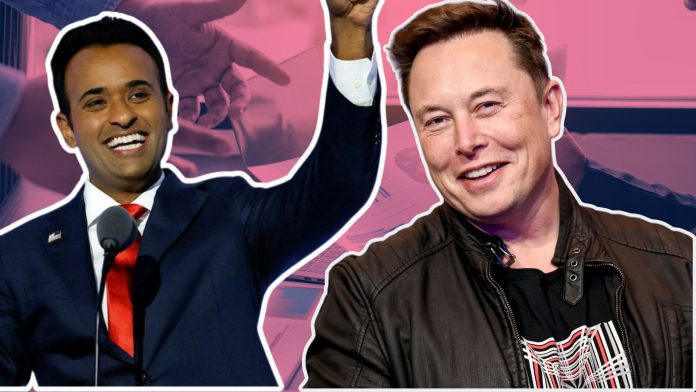President-elect Donald Trump appointed tech billionaire Elon Musk and conservative activist Vivek Ramaswamy to lead a new Department of Government Efficiency (DOGE) to reduce government spending and dismantle bureaucracy.
In a statement on social media, Trump emphasized that the department would work to cut excess regulations and streamline federal operations, fulfilling a campaign promise to give Musk substantial oversight of government spending.
Musk, known for his leadership of Tesla, SpaceX, and social media platform X, has previously advocated for significant cuts to the federal budget, including a $2 trillion reduction. Though he has been vague on specifics, Musk has expressed interest in targeting smaller federal agencies, such as the Department of Education and NPR. His proposed budget cuts, he admits, may result in “temporary hardship” for some individuals. The new department is expected to advise the White House on overhauling federal agencies without requiring Senate approval. Musk’s statement on X highlighted the department’s potential to disrupt bureaucracy, calling it a threat to inefficient government systems rather than democracy itself.
Ramaswamy, a former Republican presidential candidate, has long championed the idea of slashing federal agencies, with some of his key targets including the FBI, the Department of Education, and the Food and Nutrition Service. He has also advocated for mass layoffs within federal agencies, suggesting that mandating a standard workweek for government employees could lead to major reductions in bureaucracy. Ramaswamy’s approach aligns with Trump’s broader agenda of reducing government size and cost.
Trump envisions DOGE as a “Manhattan Project” of modern times, set to deliver drastic changes by July 4, 2026. The department will operate outside of traditional government structures, allowing Musk and Ramaswamy to maintain private-sector roles while advising the administration on governmental reforms. Trump may also seek “presidential reorganization authority” from Congress to consolidate or eliminate federal agencies and reduce the federal workforce, potentially re-signing his “Schedule F” executive order to allow for the political reclassification of federal workers.
Moreover, Musk’s SpaceX has received billions in federal contracts, raising questions about how his leadership in DOGE could impact the company’s government business. Meanwhile, Ramaswamy’s biotech background and 2024 presidential campaign experience bring a different set of expertise to the table. Trump’s decision to place Musk and Ramaswamy at the helm of DOGE combines the tech mogul’s financial insight with Ramaswamy’s conservative stance on federal governance.
While the specifics of how the department will be funded and operate remain unclear, Trump’s administration aims to tackle inefficiency, waste, and redundancy in the federal system. The Government Accountability Office has indicated that it will assist the new department with relevant data and recommendations to ensure fiscal efficiency.
In an interview with NBC News, Robert F. Kennedy Jr., who may oversee public health efforts in Trump’s administration, also emphasized a focus on cutting government departments, particularly in the health sector, further aligning with Trump’s goal of reducing the scope of federal agencies. As these developments unfold, we will see how the new department impacts government operations and the federal workforce.



